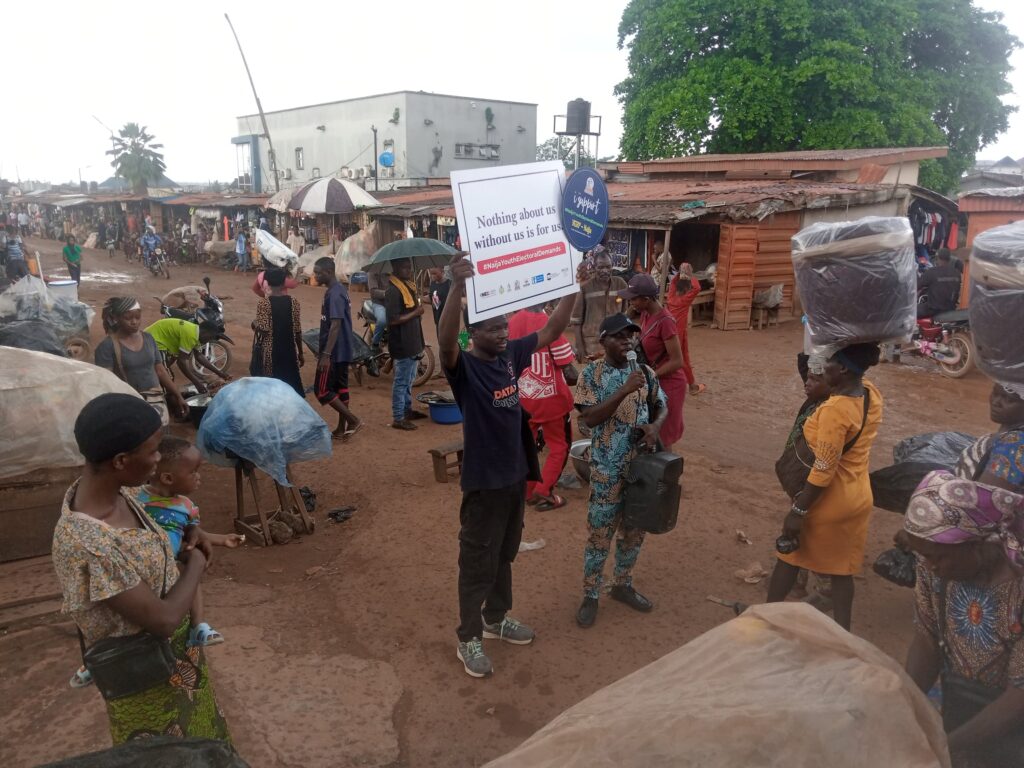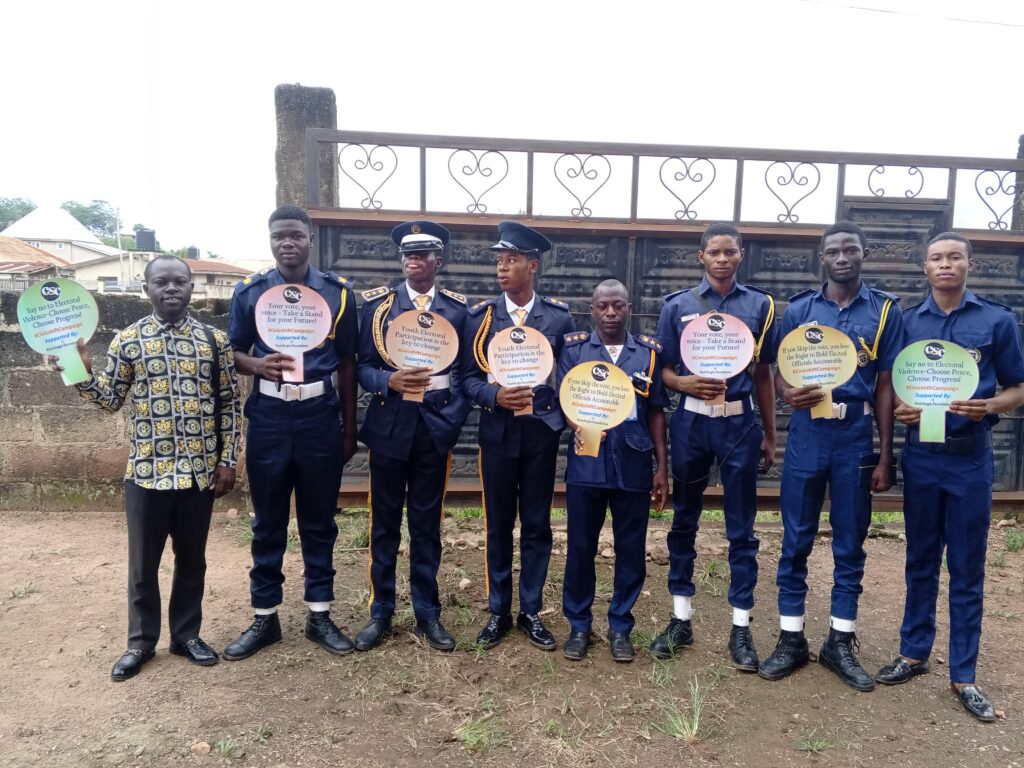by Sunday Akinrelere, by HTCI Fellow
In Ondo State, voter turnout has steadily declined in recent years. Data from Govote shows that only 39% of eligible voters in Ondo State participated in the 2012 gubernatorial election, dropping to 35% in 2016, and further to 33% in 2020. This trend, while troubling, emphasises the urgency of addressing the youth mindset toward elections. It is believed that a renewed focus on youth engagement, beginning with changing attitudes and building civic knowledge, can change this trajectory. Hence, the emergence of the Civic Shift Campaign Initiative.
The Civic Shift Campaign aimed to address the issue of low youth participation and awareness in electoral processes in Ondo State by empowering youth champions with advocacy skills in order to foster a culture of civic responsibility. By organising virtual training for civic champions in each of the 18 local government areas, a coordinated 60-day social media campaign and in-person mobilisation activities, the project intended to contribute to civic education and engagement.
The project began by recruiting Volunteer LGA Lead Advocates across the 18 Local Government Areas in Ondo State. Following their selection, these advocates received step-down training sessions covering key topics from the HumAngle Technology and Civic Impact Fellowship, including principles of advocacy, and ethical considerations in leveraging technology for impact. This training equipped them with the skills needed to navigate the complexities of advocacy work, laying a solid foundation for the campaign.
Armed with the requisite skills and knowledge, the team launched a 60-day strategic media campaign using coordinated hashtags: #CivicShiftCampaign, #YouthVoteMatters, #OndoDecides2024, and #HTCIF. Through X (formerly Twitter), Facebook, and Instagram, the team shared messages urging young people to see voting as an essential duty and a means to influence governance positively. This online advocacy expanded the campaign’s reach significantly, drawing attention from a broad spectrum of youth across the state.
Complementing the online efforts, the advocates also conducted in-person sensitization activities, engaging young individuals and visiting youth-based organisations with messages emphasising the importance of electoral participation and integrity. Hundreds of young people were engaged directly, and over 5000 youths were engaged indirectly or virtually, cultivating a culture of civic responsibility.

As is always the case with significant social change, there were certain challenges on election day, the 16th of November. Low voter turn out due to years of distrust in the electoral process and vote-buying were rampant.
In my polling unit, only 148 out of 756 registered voters showed up to vote, as announced by the INEC official. This number is ridiculously low. While observing the election, I saw people selling their votes for amounts ranging from ₦5,000 to ₦10,000, despite efforts to discourage this practice.
Challenges Faced
1. Low Voter Turnout
Despite all the awareness efforts, not many people came out to vote. This was due to fear of violence, lack of trust in the system, and problems like errors in the voters’ register. Data from Datatphyte shows that in the past six Ondo State elections, an average of 666,000 people voted. In 2020, 591,193 people participated in the election, but in 2024, only 508,963 out of over 2 million registered voters showed up, according to Ready To Lead Africa. Many people stayed home because they were scared. Ondo governorship elections are often more intense than presidential elections because they directly affect the grassroots, and there have been violent incidents in the past.
Secondly, many people think it’s nearly impossible to defeat an incumbent governor in an election because they have strong support in every local government, access to state funds, and backing from the federal government. This belief in the power of incumbency discouraged some voters from even coming out to vote.
2. Vote-Buying
A big issue was vote-buying, where political parties offered cash to voters. Poverty makes it easy for some people to accept money in exchange for their votes. Unfortunately, many young people prioritised immediate financial gain over the long-term consequences of their choices. For instance, some voters took pictures of their marked ballot papers as proof to get paid, while others showed party agents their votes to collect their money, usually ₦10,000 or less. Yiaga Africa condemned the observed incidents of vote-buying.
3. Errors in the Voters’ Register
The list of registered voters had many inaccuracies. For example, names of people who have passed away, including my late mother, were still on the list. Some registered voters had moved to other locations and couldn’t travel back to vote due to the restrictions on election day. This shows the need for continuous voter registration throughout the year, so people can update their information and vote where they live.
Success Stories
1. Increased youth Involvement
The Civic Shift Campaign encouraged many young people to take an active part in the election. Some became election observers, while others acted as advocates for good governance. Before the election, the campaign motivated youths to see voting as a way to make a difference. It moved them from being passive spectators to active participants in the process.
2. Peaceful Election
The election was generally peaceful, and organisations like the Centre for Democracy and Development (CDD) commended voters for maintaining calm. The Civic Shift Campaign also contributed in promoting this peaceful environment through its 60-day online advocacy, targeted at youths.
3. Changing Mindsets
The campaign helped spark a change in how young people think about elections. We reached more than 5,000 young people to help them see themselves as active contributors to governance. This mindset shift is a gradual process, but it’s a sign of progress. The work doesn’t end here; we must continue this advocacy beyond the 2024 election.
Conclusion
The 2024 Ondo gubernatorial election showed that creating a free, fair and credible electoral process takes time. The Civic Shift Campaign made a good start, but there’s still a lot to do. We need to tackle issues like poverty, fix problems with the voters’ register, and push for better policies. Most importantly, we must keep educating people about the power of their votes. I believe that even small, consistent efforts can bring big changes over time.
On a personal note, this project has shown me that:
1. It is important to involve young leaders from the grassroot in advocacy efforts for localised engagement. This helped make the project widespread in the state. Otherwise, the project would have been implemented centrally, covering only a few youth populations.
2. Consistency is key in building trust and credibility. Our unwavering consistency showed the team’s level of seriousness or commitment to civic responsibility, and it gradually transformed scepticism into engagement among young eligible voters. Knowing that a shift in mindset occurs gradually, consistency in messaging using the unified hashtags is crucial in changing humans’ attitudes.
3. Both the online and on-site advocacy efforts hold power. None is better than the other. The blend of the online and offline engagements strengthens our reach. While the online campaign allowed us to reach a wider audience, the in-person (community) engagements across the LGAs were invaluable for deeper conversations and genuine connections.
4. The place of mentorship cannot be overemphasised. The mentorship support received from the HumAngle Technology and Civic Impact Fellowship was instrumental in navigating challenges, staying on course, and creating data-driven content and messages which gave weight to our advocacy.
5. Motivating team members is essential for a project’s sustainability. Advocates’ enthusiasm increased when they were motivated through the weekly spotlight and other forms of motivation, ensuring the successful implementation of the initiative.
I hope to keep the momentum alive, while establishing partnerships with relevant stakeholders and nonprofit organisations for its sustainability.



